
Issue 183
October 2019
How can you know when it's time to go? For Rashad Evans, saying goodbye to the octagon after a hugely successful career was traumatic, but staying might have been even worse.
Rashad Evans is being very honest, completely open, wanting to reveal the mental difficulties a fighter goes through at the end of his or her career, and how to recognize it. He's talking about many subjects that are still taboo in MMA. But as the sport develops, these issues are going to come more and more into detailed focus.
Rashad, both an articulate fighter and speaker, fought a Who's Who in the UFC's light-heavyweight division and as a former champion and elite fighter, found it incomprehensibly difficult to make a decision to retire. The 39-year-old told Fighters Only in an exclusive interview that it felt like "a break-up", the end of a long relationship. But he also shed light on his belief that the mental issues fighters go through should be talked about more and that PTSD could be an affliction suffered by many fighters. We have interviewed several voices on this subject which are included at the end of this feature.
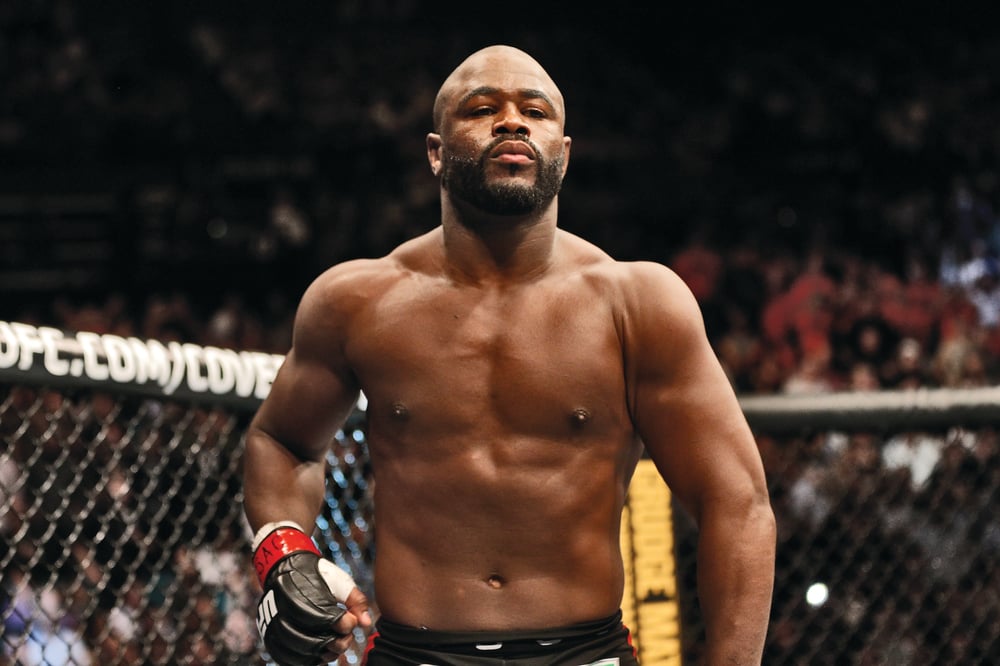
But going back to his career, which he called time on last June, there were five defeats in a row. His last victory was against Chael Sonnen in 2013. “It was a breakup to say the least. Like a breakup, it’s a painful process and like a breakup, you don’t know if you’re making the right choice. It’s the love that I have for the sport that allowed me to compete and achieve the heights I did.
"But, it’s that same love that made it hard to walk away from it. It’s given me so many great memories. I’ve defined myself for the longest time as a fighter, even though when I started out I told myself I would never define myself as a fighter. Fighting is one of those sports you don’t just do, you become. I can’t play fighting. There’s no games in there. When I’m out there doing it I become it. And when it came time to walk away, that’s why it was so hard.”
Evans, although he never intended it to be so, developed, he believes, a kind of alter-ego that was his fighting persona. Indeed, over the years, I have found that fighters are very different in fight weeks to the way they are outside that period, or outside training camps. Not all, but many of them.
“Absolutely," agreed Evans. "My life was shut down when it was time for fight camp. You put your whole life on hold. I really looked for those parts in my life, now that I don’t have it. Now that I’m just straight living and not fighting. I do miss those times where I really shut my life down and just focused on fighting. You do have an alter ego because you have to. I have to be able to have a contrast between the person I am now to the person who can access the animal side of myself.
"In society we’re not able to be that free. When you get to the cage, you do get to experience a freedom that you don’t experience during your waking life. You develop an alter ego, because you learn that’s the place where you can harness all the frustration, pain and all the things that can hold you back in your normal life. In the cage is where you get to be a superhero and just be free.”
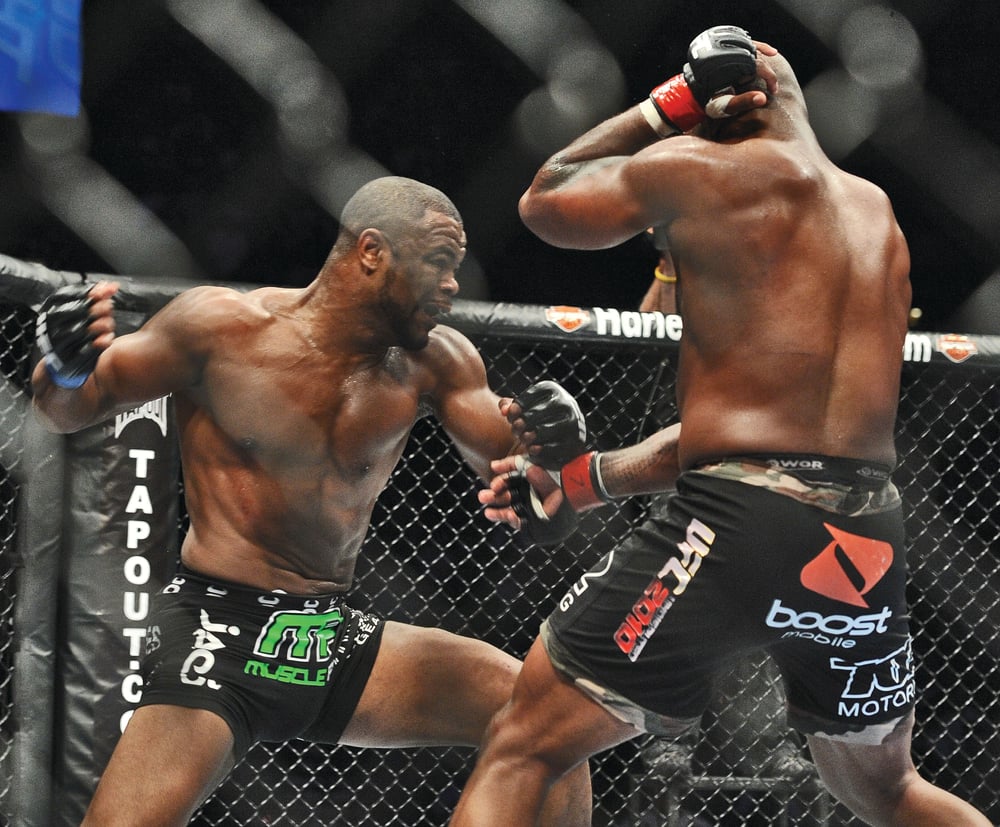
For a moment, let's just list the incredible run that 'Sugar' had in his career, from winning a TUF series, to fighting Michael Bisping in Newark, New Jersey in 2007, and then onwards. The list of opponents is staggering, both in star quality and ability. Literally a modern Who's Who of the 205lb division. So before Bisping, there was the first fight with Tito Ortiz, and one with Stephan Bonnar. Post-Bisping, Chael Sonnen, Dan Henderson, Antônio Rogério Nogueira, Jon Jones, Phil Davis, Ortiz again, Rampage Jackson, Thiago Silva, Lyoto Machida, Forrest Griffin and Chuck Liddell. The last two major names he faced were Glover Teixeira and Ryan Bader.
“Wow, that’s a tough out. It amazes me," said Evans as the list of opponents was read out to him. "Now that you say it, it is, Wow, that really happened. When I was in it, I was so into the moment all of that didn’t come into my mind. It was just competition and who I had to face. Looking back, that is an incredible list of fighters.”
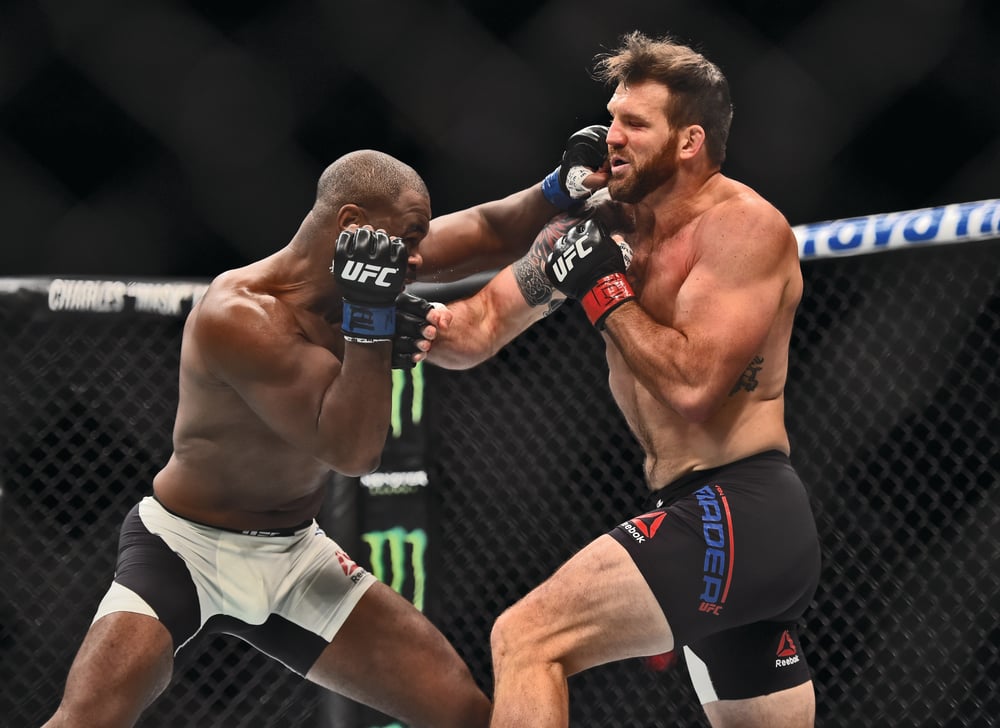
Retirement had been playing on his mind since the Bader fight, in October 2015. “When I came back from the injury for the Bader fight, I just didn’t feel the same. I didn’t feel the same about competing anymore. When it became time to perform and for my body to fire up, it just wasn’t happening like it used to happen," revealed Evans.
"That’s when I really started to notice something had changed about fighting. Something had changed about the way I feel about fighting. It was at that point that the love and fire for competing and damaging somebody started to fade away. I used to think about fighting all the time and then I started to think about it less and less.
“I enjoyed the training part, but some days it seemed harder to keep it going. I was one of those athletes that was so self-motivated who could train all day. Towards the end I really had to convince myself to be able to do what I needed to do. Once I got into the rhythm I was okay, but it became more painful for me to go through the whole process.”
There is a lesson here, moreover. That with age, and with a resume like Rashad's, the fighting lifestyle takes its toll, but the person matures. All part of the 'human cycle', perhaps. Evans had worked through the process of why he had been a fighter in the first place, why he had been drawn to test himself.
“That’s definitely a factor and it’s probably the biggest. I used to love to fight because I had that fight in me," agreed Rashad. "I had a tough upbringing, I had a lot of resentment, anger, bitterness and pain. I had all that and competing in mixed martial arts was the perfect outlet. As I competed, it was the perfect combo of my life traumas and this sport. As I lived in the sport and had successes and disappointments, I worked through a lot of those issues.
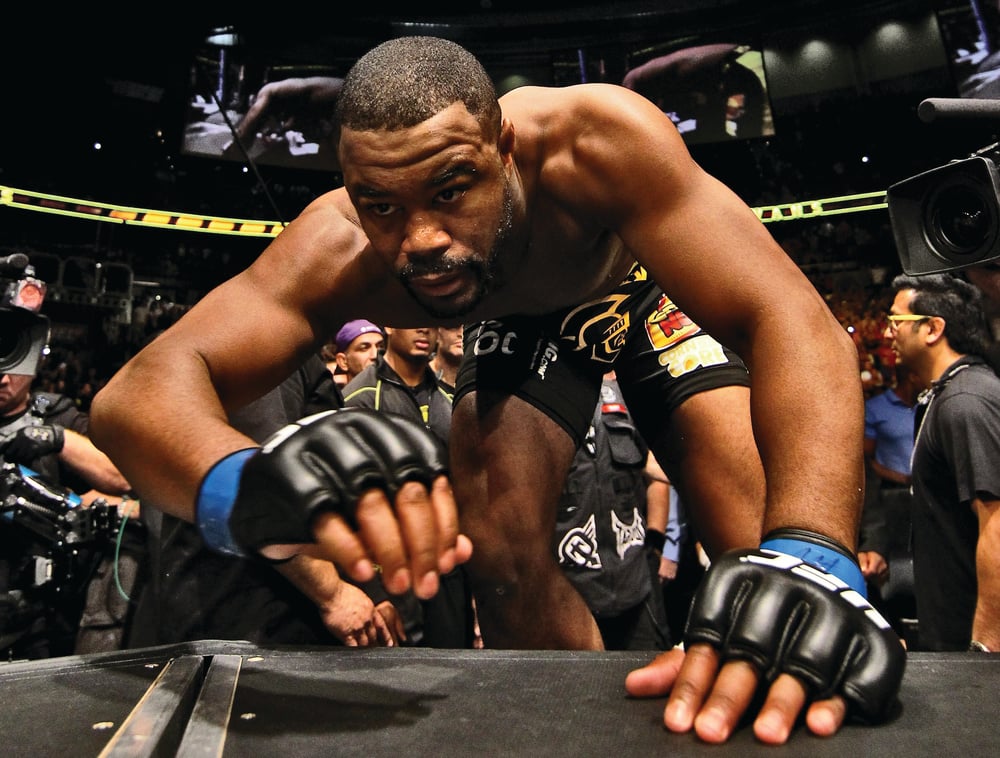
Evans believes it became a kind of therapy. "Every single time you fight you have to face yourself. When you get stuck on these traumas that happen to you in life, a lot of times we don’t face those feelings. I had to face myself in life in order to face another man in the cage. I started to sort through all of those feelings and resentments I had. Before I knew it, I found myself extinguishing a lot of those flames of anger or frustration. I used up all of my fuel, if you like. The engine was getting empty. It’s not that I couldn’t compete without that fuel, but had I recognized that was what was happening, I might have been able to recalibrate my life and my goals as an athlete. Create a new why. But it’s all about understanding that. If you don’t understand why you’re doing something you’re going to get inconsistency. That’s what I was feeling. I didn’t understand what was happening because no one talks about this type of thing. Nobody talks about it in fighting. We don’t talk about the psychological aspect of living, we just don’t do it. We’re not comfortable about it because we feel it makes you look like some sort of way. But there’s not one feeling I’ve had that everyone else hasn’t had.”
In a sense, I suggest, Rashad stopped being 'present' in what he was doing. Fighting, as he has explained, had redefined him as a person, and moving onto being a new person, a new life in effect, was so hard to comprehend. “That’s exactly what it is, we stop being present. We stop taking notice of the things around us. We can’t see it because we’ve moved on so fast because we’re so busy looking for the next thing.”
In the end, was he just fighting to be paid, because he saw it as his job?
“A little bit of that. I can’t say I was truly fighting to be paid at the end, because there was a piece of me that truly believed I still wanted it. That was just the whole part of me not fully facing myself at that level yet. Having gone through that experience, I can now fully articulate it to you. But at the time, I was still in my in-between space. I was fighting as the Rashad Evans of old, but I feel different. I couldn’t make head or tail of these feelings until it was over.”
It must have been hard over the last four years, with losses against the likes of Dan Kelley and Sam Alvey.
“That was upsetting, but at the same time who is to say who should win a fight. I felt like I was better than them. But, in my mind I feel that I was a different kind of athlete. I felt I was on another level than those athletes. I allowed myself to lose those fights. My mental game wasn’t right going into those fights. I was in a weird place mentally, as far as competing.
“Even in my personal life, I was in a weird place. A lot of things I felt I had got over in my personal life ended up coming back to haunt me in a bad way. I wasn’t expecting that. I got a divorce and it was really hard to adjust. There’s a true hangover effect of the whole thing that you don’t think is going to come. Having that and having your relationship with your children affected as a result of that. All those things happened. They play into your mind and play into your mind on fight night. I was dealing with that and I didn’t take the time to face what was going on with me from an emotional standpoint.”
Another aspect which is coming more and more into focus is the nerves that all fighters are dealing with, which in itself is another taboo subject in the sport.
“It’s something no one talks about but it’s something everyone goes through. It’s something that can really defeat you if you’re open with yourself about it," he explained. "That’s one thing you have to understand. I always go back to Randy Couture, he told me I had to embrace the worst outcome and make friends with it. That is something that is hard for a lot of fighters to do. What you’re doing is you’re accepting a fate you don’t want to happen. There’s a magic of that release and competing anyway.”
So, is the Rashad Evans that placed his gloves down a year ago after defeat to Anthony Smith now content.
“I am at peace with stopping. But, I’d be lying if I said I didn’t miss it on a level that is really just unexplainable. And by that I mean, fighting for me and going through the training camp was so much about the journey along the way," he explained. "It was about fighting in the end, but training camp was about what the weeks were like, what I had to overcome and finally fight night. What was I like on fight night? How did I face it? How did I feel? It was always such a big spiritual test for me, every fight. Every fight I'd grow spiritually, so I miss that. I miss the gains I’d get on a personal level. The fight results were what they were, but I always gained so much personally.”
How has he filled the void?
“It’s been a difficult void to fill. I enjoy working on different projects. I enjoy working with the company Onnit, for example. It’s a different kind of feeling, but it brings a different kind of excitement when you go into a board room and present something you want people to buy into. I’m competing in a different world. The business world is a different world that brings some excitement. That’s been able to fill a piece of it, but at the same time... I’m a fighter. It’s who I am. I do still go to the gym and have a scrap. I can't stay away from it the whole time.”
Evans is also working with the broadcasters CBS as an analyst.
“Every week I work with them and every week I’m around it. It’s cool because I love the sport so much and I’m such a fan of it. I enjoy that aspect, but when I do watch fighters like Manny Pacquiao in boxing who is 40 years old and looking amazing against guys like Keith Thurman, I do think maybe I can do it again. But right now I just sit back and enjoy what I’m doing.”
Are fighters suffering from PTSD?
Rashad Evans believes it's a question that needs to be asked and investigated by MMA's medical experts.
The more we know about the brain and our sport, the more complex is our understanding of fighters. Rashad Evans has told Fighters Only he's convinced that fighters can suffer from Post Traumatic Stress Disorder (PTSD). This is just beginning to be discussed in the sport, but it's a theory given backing by other fighters, coaches, and medical experts. Perhaps being poker-faced, being 'hard', sucking it up, being brutally knocked out does take a terrible toll on fighters.
“There’s a lot of PTSD that comes from those experiences in the cage," explained Evans, now 39, who had 28 fights between 2004 and 2018. "You see a lot of fighters who have tough experiences, and as they get older, it becomes harder to mentally be in there. That’s because you have a lot of trauma that comes along with your cage experiences. There’s a lot of great moments, but there’s a lot of bad. Fight depression is sometimes real. I’m not trying to say this lightly, but it can make you want to commit suicide."
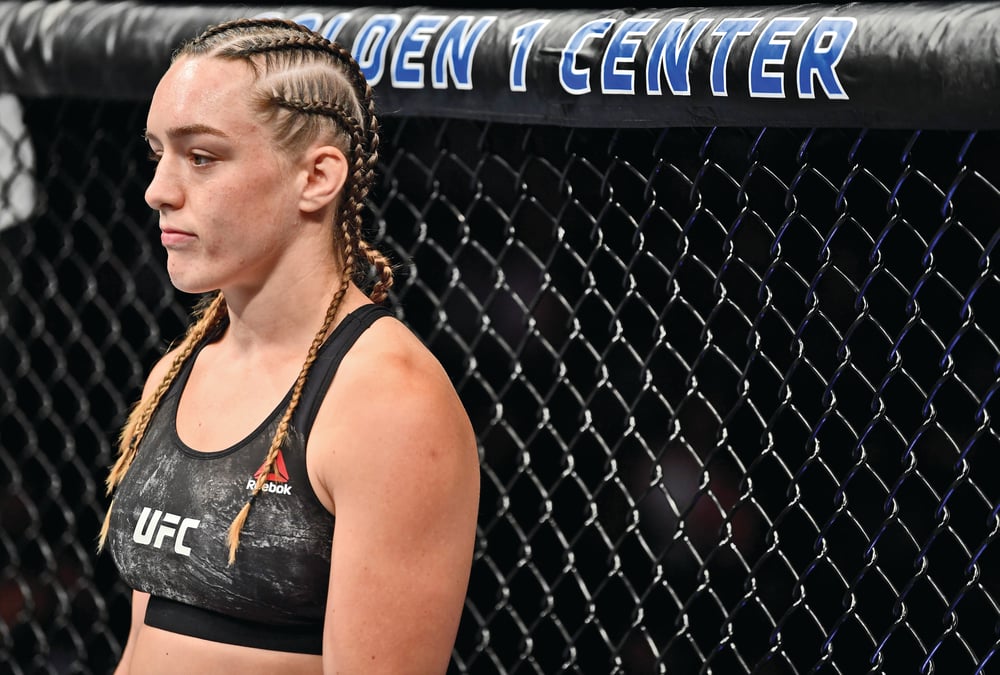
We might look at the recent comments Rory MacDonald made after his five-round fight with Jon Fitch in defense of his Bellator welterweight title; the mindset of Tony Ferguson in the UFC, or indeed the body language of Aspen Ladd as she prepared to face Germaine De Randamie.
"It’s the highest of highs and lowest of lows," added Evans. "You feel bad when you feel that low. It can be very traumatic. It’s all about facing that so you can get past it. If you’re caught up in a traumatic fight, then you have to be able to talk to a professional so you can put it in its rightful place."
Serious stuff. Serious enough, indeed, to be treated with great care. Indeed, Michael Bisping recently finished his UFC Hall of Fame speech in Las Vegas along similar lines.
Britain's most successful MMA fighter told me: “100 per cent [it can be there] with the depression and anxiety. Especially with fighters who are left on the shelf after they retire. I don’t watch this show, but I saw a person from Love Island (a reality TV series) coming out and committing suicide, which is incredibly sad. What do you think fighters go through?"
"They’re on top of the world one moment and then on the scrap heap the next. People talk so much shit online. That’s why I said at the end of my Hall of Fame speech to take it easy on fighters when they’ve lost because they’re crushed inside. You’ve got to put on a brave face. At times I broke down in tears, but not in public. I don’t know if PTSD is the correct term for it.
“Combat sports can be the best sport in the world or the worst sport in the world. Fighting is a physically straining thing, but mentally it is also very tough.”
Dr Chris Lam, a fight sports ringside and cageside physician, who also works in his full-time role as a doctor at The Manchester Institute for Health and Performance, does not rule out the idea
"There could well be a fine line between PTSD and CTE, (Chronic Traumatic Encephalopathy) and it may simply be a sliding scale. You could say PTSD is along the lines of American footballers and CTE and the problems they’re having. I think it’s on the same spectrum. I think PTSD is another word for it.”
Lam believes it should be investigated further.
“I certainly think there’s a case for having a closer look at it. There’s a fine line between PTSD and CTE. They’re linked. The symptoms are really similar. You get flashbacks, headaches, nausea, vomiting, personality issues, anxiety – I think it’s all part of the same spectrum, just under different names.”
Lam also believes the guidelines will change as our knowledge increases from medical science.
“They say 90 percent of the fight is mental. If you’re not mentally prepared, that gives you a disadvantage."
Lam believes fans – and indeed the promoters – should err on the side of fighters if they are not right before fights and need to pull out.
Back to Evans, who added: "We should take it seriously going forward. I think no matter what we’re talking about here, as long as you can put trauma in its rightful place and in a place where you can look at it, I think you can always get over trauma. But if you’re not facing it or understanding you’re suffering from trauma, you’ll continue to suffer and it’ll only get worse. For example, look at James Vick. He’s on a three-fight losing streak and he’s had some devastating losses on the way. We needed to take some time with him, get a mental coach and rebuild his game.”
We talk of Aspen Ladd's body language against de Randamie. Yes, the weight cut was difficult, yet 30 hours later, on the verge of fighting, the hitherto unbeaten fighter looked spaced out. She lost by TKO in sixteen seconds.
"Sometimes it’s the little things that disrupt your confidence,” Evans explained. “A tough weight cut could ruin your confidence. Or maybe she woke up that morning and felt flat. It’s sometimes just something that doesn’t go your way. The negative chatter starts in your head. The negative narrative starts to happen. If you don’t have somebody there that can talk you off that ledge, you’re going to jump. You’re going to jump into that pool of insecurity.”
Or MacDonald, stating that he was "not sure if he wanted to hurt anyone anymore".
“He’ll never forget where he had to go in order to bring that out of him. Sometimes it’s a point of no return," reckoned Rashad. "You don’t know what’s on the other side of that wall, even though you may have done it before. You don’t know. When you have to go that deep, it feels like you’re facing death. It’s a scary place to be. There’s some people who embrace it. Who love to be in that position and fight well from that position. Justin Gaethje is one of those fighters. He invites that position because he knows he can endure there. He also knows most fighters can’t. They want to go back to their safe zone. Not a lot of fighters are willing to empty it out and say, You know what, this is where I'll die then.”
Evans continued: “It goes back to the saying, you don’t know what you don’t know. You don’t know those traumas are happening to you. You tell yourself you’ve been lucky and it won’t happen to you. When you get that first situation, that first knockout, you fight different. It changes the way you feel. Or you make friends with the fact that it could happen to you every single time and you make a game of that. There’s always a game to be played.”
It works the other way round, too. There are fighters who are managing PTSD from previous professions. Like the British lightweight Terry Brazier, an ex-paratrooper who left the British Army after tours of Afghanistan and was diagnosed with PTSD. Foot patrols in Helmand created trauma but fighting now helps.
"For me personally, training and fighting in MMA helps with controlling my PTSD” explained Brazier. “It's a great stress relief and something to focus on. I can see in extreme cases that fighters can suffer from PTSD, though. Maybe the pressure and a violent loss could traumatize someone."
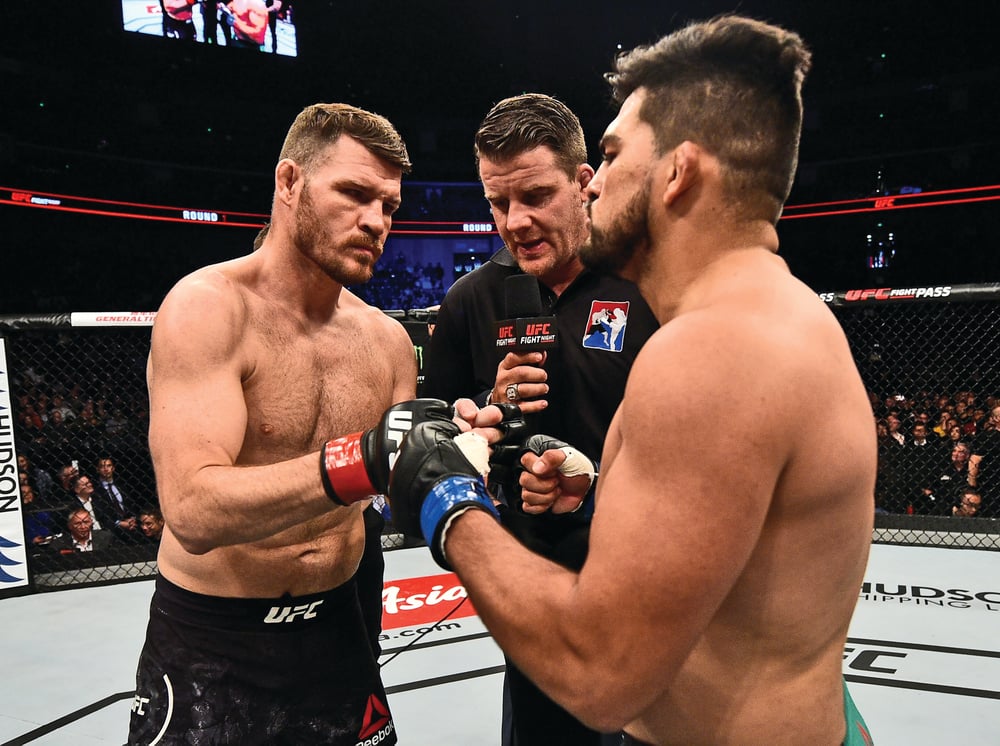
Dave Jackson, the MMA and Muay Thai coach, once a trainer of Bisping, believes fighters should not step into a fighting arena if they are not well mentally.
“You hear incidents of fighters who have been knocked out and then are doing strange things. But I don’t think that’s anything to do with the sport. I think that’s to do with a human being, something has happened that you didn’t expect. The reality is we’re training someone to go out and test themselves.
“But if something happens that is different to your expectation, then you could suffer. Like a bad knockout. But that’s not specific to our sport. That’s the same as a jockey who comes off and gets trampled. Or a climber who falls. Or a racing driver who crashes. There’s an element of unknown in everything. The majority of people I’ve known in our sport are good human beings, Rashad included. He’s a nice guy. I’m sure if that’s what he thinks then he may well have known someone who has had PTSD or has had it himself.”
Like Lam, Jackson believes CTE and PTSD could be a very similar type of neurosis.
“What Dr. Lam has said is pretty much how I see it,” Jackson continued. “I’ve been in the fight game for well over 30 years and it’s not something I’ve come across with any of my students. But I can see it from the person who’s been hurt and the person who has done it, I can see both being affected. Everyone sees what happens after a fight.”
It falls to Dr Lam to have the final say.
“I think we should certainly be listening to fighters and asking them the question about their mental health. We don’t ask that as part of the medical procedure. We don’t ask about bouts of depression or anything. We’ll ask about headaches and their physical health. The mental health side isn’t asked about. We should definitely pay more attention to fighters' mental health.”
It could be time for guidelines on this to be written into pre-fight medicals to ensure the mental health of fighters is being thoroughly monitored.
...









